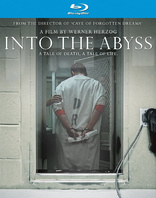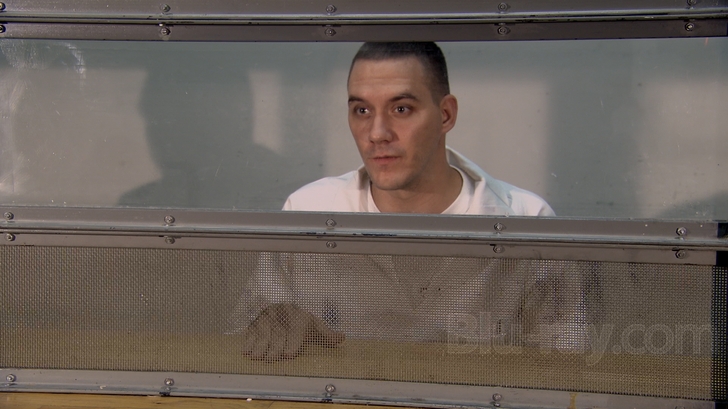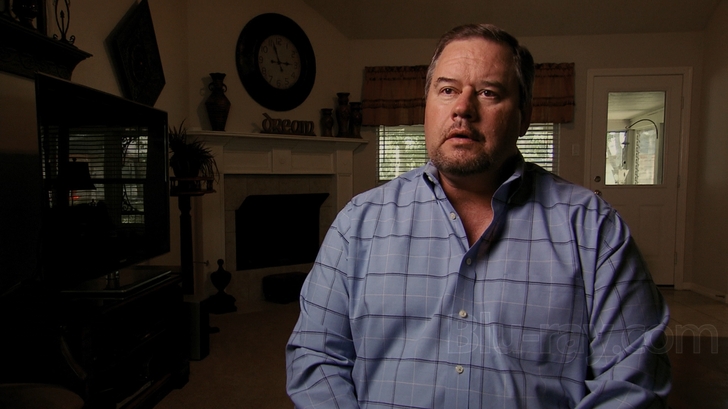Into the Abyss: A Tale of Death, A Tale of Life Blu-ray Movie
HomeInto the Abyss: A Tale of Death, A Tale of Life Blu-ray Movie 
MPI Media Group | 2011 | 107 min | Rated PG-13 | Apr 10, 2012
Movie rating
7.2 | / 10 |
Blu-ray rating
| Users | 0.0 | |
| Reviewer | 3.5 | |
| Overall | 3.5 |
Overview
Into the Abyss: A Tale of Death, A Tale of Life (2011)
Conversations with death row inmate Michael Perry and those affected by his crime serve as an examination of why people - and the state - kill.
Director: Werner Herzog| Documentary | Uncertain |
| Crime | Uncertain |
Specifications
Video
Video codec: MPEG-4 AVC
Video resolution: 1080p
Aspect ratio: 1.85:1
Original aspect ratio: 1.85:1
Audio
English: DTS-HD Master Audio 5.1
English: LPCM 2.0
Subtitles
English SDH, Spanish
Discs
25GB Blu-ray Disc
Single disc (1 BD)
Playback
Region A (B, C untested)
Review
Rating summary
| Movie | 4.0 | |
| Video | 3.5 | |
| Audio | 4.0 | |
| Extras | 0.5 | |
| Overall | 3.5 |
Into the Abyss: A Tale of Death, A Tale of Life Blu-ray Movie Review
Move over Truman Capote.
Reviewed by Casey Broadwater March 29, 2012For his last documentary, Cave of Forgotten Dreams, German filmmaker Werner Herzog stared back through the chasm of time, speculating about the artistic ambitions of cave painting proto-humans in the south of France some 35,000 years ago. His new film, Into the Abyss, finds him gazing into a darker void--the unnecessary waste of human life by murder and, subsequently, capital punishment. The subject is a perfect fit for Herzog--Abyss' subtitle, A Tale of Death, A Tale of Life, could apply to almost any of the director's films--but unlike most of his documentaries, Herzog withholds his usual poetic, philosophizing narration here, preferring instead to simply question his subjects and let them reveal the hard truths he's after. Early in the film, he does make his own opinion known--"I think human beings should not be executed. It's as simple as that."--but Herzog isn't out to make a fiery anti-death penalty polemic. He's more concerned with investigating the intersection between the almost-comic absurdity of crime and the heartbreaking tragedy of those it affects.

Michael Perry, eight days from death.
Like Truman Capote's In Cold Blood, Into the Abyss hones in on the true-crime story of two convicted killers, 28-year-old Michael Perry--who was executed only eight days after Herzog interviewed him--and his accomplice Jason Burkett, who is currently serving a life-sentence in a Texas prison. On October 24th, 2001, the two men devised a plan to steal a red Camero and an Isuzu SUV from Sandra Stotler, the mother of their mutual acquaintance, Adam. A few days later, Sandra was found wrapped in a sheet in Crater Lake. She'd been killed by two shotgun blasts while making cookies. Her son and another boy, 18-year-old Jeremy Richardson, were likewise discovered in a nearby wooded area, dead of gunshot wounds. Perry and Burkett bragged about the theft of the cars to friends, but their joy-riding was short-lived. They were arrested after a high-speed chase that culminated in a crash and a shootout with the cops. To his death, Perry--a smiling goof who looked much younger than his age, with hair plastered across his forehead--maintained that he was wrongfully accused, even forgiving "those involved in this atrocity" with his last words. Burkett claims he's innocent too, blaming the triple homicide entirely on Perry. But Herzog doesn't seem too hung up on their respective guilt or innocence. Instead, he emphasizes the utter pointlessness of the crime itself. The reality sinks in when a police officer takes the director to an impound lot where the '97 Camero still sits, rusted and overgrown with weeds: "Three people died for this car. A car that was in their possession less than 72 hours." It'd be funny if it weren't so awful.
How and why does something like this happen? There are economic and education-related answers, as well as the standard nature versus nurture debate, but Herzog sums it all up when he tells Perry, "I have a feeling that destiny has dealt you a very bad deck of cards." Not that Perry played them well; he came from a supportive family who actively wanted to help him, but he ran away from home in junior high and basically became a drifter, eventually hooking up with Burkett, who gave him drugs and a place to crash. When Herzog asks Burkett about his own family, the convict reveals that his father is "across the street," in another section of the prison, also serving a life sentence. That explains a lot, and Herzog's subsequent interview with the man is one of the film's most crushing scenes. Burkett's dad recalls being transplanted between prisons while handcuffed to his own son, and he breaks down, unable to describe the feelings that moment raised. "Try to describe it," Herzog pushes, and the man admits, "I just felt like a total failure as a father." If there's any redemption here, it's that Burkett's dad was allowed to appear at his son's trial and plead with the jury to consider the boy's hard-knock upbringing. Two of the jurors were swayed by the appeal and kept the rest from delivering an unanimous death sentence.
For much of the documentary, Perry and Burkett take a back seat--so to speak--to others who have been affected by the crime, or by the death penalty in general. We meet Adam Stotler's sister, who can no longer keep a phone in her house because she's perpetually afraid of getting bad news, and Charles Richardson, who somehow scrapped together enough cash to fly back to Texas after his younger brother's death, only to be arrested at the funeral for bond-jumping. (Charles' father is also in prison on murder charges. You get the feeling from the film that there must be something in the water in Texas. I haven't even mentioned Burkett's friend, an illiterate man who recounts once being stabbed with a foot-long screwdriver) And then there's Burkett's wife, Meylessa, who fell in love with him while working with the Second Chances organization, and who's mysteriously pregnant with his child even though the prison doesn't allow conjugal visits. Herzog presses her on how the fertilization took place, but she stays mum. This in itself is remarkable, as the director is otherwise damn good at getting his subjects to open up, especially considering how he reportedly only shot eight hours of footage--total--for the 107-minute film.
Into the Abyss is bookended by two interviews that subtly make a case against the death penalty. In the prologue, Death House chaplain Richard Lopez discusses his job consoling young men in their final minutes before lethal injection. When the Reverend goes off on a tangent about the wonders of God's creation--including seeing wildlife on a golf course--Herzog, in his enigmatic way, asks him to "describe an encounter with a squirrel." It's such a strange thing to ask an interview subject, but it leads to Lopez tearing up as talks about how he can save a squirrel's life by braking his golf cart, but he can't stop the process for a man who's made poor decisions and now finds himself strapped to a gurney, about to be killed by the state. His point is that life, innately, is precious, and that it's a shame whenever it's taken away. At the end, Herzog's interview with former executioner Fred Allen shows the toll capital punishment takes on those responsible for carrying out the injections. After overseeing the death of murderer- turned-born-again-Christian Karla Faye Tucker in 1998, Allen had a total change of heart and came to the conclusion that "nobody has the right to take another life." Herzog doesn't present any voices from the pro-death penalty contingency, but that seems partially to be the point--from his perspective, there's no longer even a debate over the issue.
Into the Abyss: A Tale of Death, A Tale of Life Blu-ray Movie, Video Quality 

Into the Abyss was shot quickly and cheaply with digital cameras, and on Blu-ray, where it's been given a 1080p/AVC-encoded presentation, the film has a very "TV documentary" quality. (Which makes sense given that it was funded entirely by the Investigation Discovery network.) I could complain about certain video-related quirks--how the image sometimes has a hard-edged, overly digital look, how there are some noticeable artifacts in fine textures and patterns, etc.--but that would be nitpicky. The fact is, this is a solidly watchable image with no major distractions. The picture is a little soft at times, but there's never any doubt you're looking at natively high definition footage. (Except, of course, when Herzog uses police crime scene video, which is clearly standard def and not cropped to widescreen.) Color is strictly realistic and contrast levels don't look like they've been tampered with much since the video files came out of the camera. This one won't win Herzog any awards for best cinematography, but it doesn't need to.
Into the Abyss: A Tale of Death, A Tale of Life Blu-ray Movie, Audio Quality 

The same goes for disc's default DTS-HD Master Audio 5.1 surround track, a mix that's almost purely functional. The main emphasis is on capturing and reproducing clean, easily understood vocals from the interview subjects, and in that respect, the track completely succeeds. The rest is ancillary. There's a jangly, minimalistic southwestern guitar score that accompanies the harrowing accounts of the crime perfectly, and the rear channels even come to life occasionally to deliver outdoorsy ambience. In one scene, where a police officer shows Herzog where Sandra Stotler's body was found, the screech of angry crickets comes from all sides--an effectively jarring aural assault. The disc also includes a capable Linear PCM 2.0 mix-down, along with optional English SDH and Spanish subtitles.
Into the Abyss: A Tale of Death, A Tale of Life Blu-ray Movie, Special Features and Extras 

The lone extra on the disc is the film's theatrical trailer, in high definition.
Into the Abyss: A Tale of Death, A Tale of Life Blu-ray Movie, Overall Score and Recommendation 

I don't think Herzog's consciously out to sway minds one way or another over the death penalty debate. He just wants us to remind us that capital punishment is an issue worthy of our society's careful consideration. Into the Abyss does indeed fall squarely into what you might call the "pro-life" camp, but Herzog is far less interested in mounting a logical argument against the death penalty than he is in simply recounting a heinously pointless crime and showing its human ramifications. More than anything, this is just a plain old sad story--an all-around waste of human life. I don't know how often you'd actually watch the film, so I'm not sure it's blind buy-worthy, but it certainly deserves to be seen at least once. Recommended!
Similar titles
Similar titles you might also like

The Look of Silence
2014

Streetwise
1984

The Thin Blue Line
1988

Cameraperson
2016

Time
2020

The Dog
2013

West of Memphis
2012

Cocaine Cowboys: Reloaded
2006

The Great Buster: A Celebration
2018

Fire at Sea
Fuocoammare
2016

The Maestro: King of the Cowboy Artists
1994

All the Beauty and the Bloodshed
2022

Boris Karloff: The Man Behind the Monster
2021

Hitchcock/Truffaut
2015

Jodorowsky's Dune
2013

Never Surrender: A Galaxy Quest Documentary
Slipcover in Original Pressing
2019

The Ambassador
2011

The Emperor's Naked Army Marches On
ゆきゆきて、神軍 / Yuki yukite, shingun
1987

The Story of Film: An Odyssey
2011

La Soufrière
1977